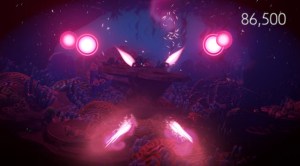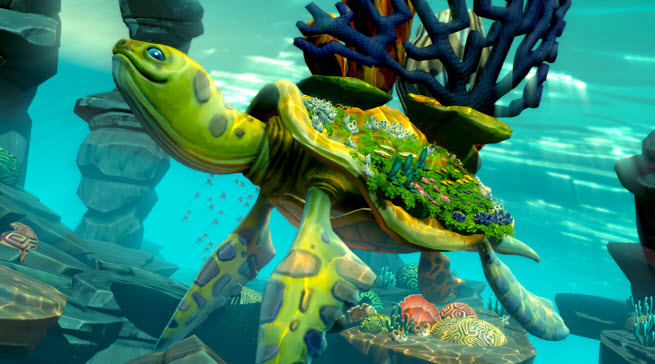Harmonix Music Systems and Disney Interactive attempt to revive the music game business with Disney Fantasia: Music Evolved. They’re billing it as a breakthrough musical motion game.
It will be an exclusive for Kinect on both the Microsoft Xbox 360 and the Xbox One game consoles. It has been in development in stealth for more than three years, and it will be published in 2014.
Harmonix has always led the change in music gaming. Founded in 1995 by Alex Rigopulos and Eran Egozy, Harmonix wandered in the wilderness for a long time. It helped pioneer the faux guitar craze with Red Octane in 2005 with Guitar Hero. Activision, the publisher of Guitar Hero, acquired Red Octane, but Harmonix escaped its grasp. So Harmonix then teamed up with Electronic Arts to make a game with multiple band instruments. Rock Band debuted in 2007 as the primary competition to Guitar Hero. It co-created The Beatles: Rock Band with MTV Games.
 Cambridge, Mass.-based Harmonix went through an acquisition by Viacom, owner of MTV, and then a divestiture that turned into a legal mess. Music games, meanwhile, grew to a billion-dollar business and then collapsed as fans got tired of the lack of innovation with faux guitars. Then Harmonix reinvented the genre again in a big way with Dance Central for Microsoft’s Kinect in 2010. The whole market shifted from guitar games to dance games, and Activision shuttered its guitar business altogether.
Cambridge, Mass.-based Harmonix went through an acquisition by Viacom, owner of MTV, and then a divestiture that turned into a legal mess. Music games, meanwhile, grew to a billion-dollar business and then collapsed as fans got tired of the lack of innovation with faux guitars. Then Harmonix reinvented the genre again in a big way with Dance Central for Microsoft’s Kinect in 2010. The whole market shifted from guitar games to dance games, and Activision shuttered its guitar business altogether.
Disney Fantasia game signals another big moment for music games, said Alex Rigopulos, co-founder of Harmonix, in an exclusive interview with GamesBeat.
Fantasia is a beloved 75-year-old film with eight memorable vignettes put to classical music. The most iconic of those is a dream sequence with Mickey Mouse as The Sorcerer’s Apprentice, conducting music across the heavens and the seas. If you are expecting to see Mickey Mouse in this game, conducting classical music against the backdrop of the Fantasia film, you couldn’t be further away from what Harmonix is trying to do with this game. At least that’s our impression from what we have seen so far.
“We went further than the film itself into the archives and got access to Walt Disney’s production notes,” Rigopulos said. “We never wanted to make a game of the movie. Instead, we looked at Walt’s creative ambitions. We’re updating those for a modern rendition.”
In the core gameplay, you’ll be able to match your full-body motions to the sound of music and morph that music on the fly to your own liking. You can do so to the tunes of 25 tracks, including Bruno Mars, Fun., Kimbra, Avicii, and Queen.
I played the game in a preview session in advance of the unveiling at the upcoming E3 video game trade show starting June 9 in Los Angeles. It’s all about being immersive and interactive with the worlds of music and magic. You control the game through gestures recognized by the Kinect motion-sensing system. At first, as a song starts, you simply match your movements to the bright animations on the screen, moving your hand to the right just as a couple of animated flares cross each other on the screen. But you can also change the mix in the middle of the song, putting more emphasis on a guitar with an extended guitar solo, or shifting the mix toward drums. You effectively wind up with a remixed version of the song, and that makes you feel like you are in control of the song.
 I could navigate in three dimensions using my arms, pressing forward into the scene, or moving from side to side. You can make music by tapping objects in the sea or by moving into an object and creating a song. As you play the song, you have to match your movements to the animations that shoot across the sky like fireworks. You could play in an environment dubbed The Press, an abandoned factory that you have to restore. Or you could head underwater.
I could navigate in three dimensions using my arms, pressing forward into the scene, or moving from side to side. You can make music by tapping objects in the sea or by moving into an object and creating a song. As you play the song, you have to match your movements to the animations that shoot across the sky like fireworks. You could play in an environment dubbed The Press, an abandoned factory that you have to restore. Or you could head underwater.
In the reef, you can tap on different sea horses and bring the music to a crescendo. Or you can immerse yourself in one particular song. During the song, you can grab visual objects and manipulate them. The result is that the music changes too. While looking at a pretty underwater coral reef (known as The Shoal) and listening to the lovely voice of Queen’s Freddie Mercury during “Bohemian Rhapsody,” I couldn’t help thinking that this had nothing to do with the Fantasia that I remembered from my childhood.
But Rigopulos says that it will follow a narrative that will be familiar to the fans of Fantasia. You enter the “magical realms of Fantasia, selected by the legendary sorcerer Yen Sid to hone their musical and magical prowess as his new apprentice,” according to Disney’s description of the game. Yen Sid creates magical worlds, and your job as the apprentice is to explore them and make a musical experience in them.
“You have to prove that you have what it takes to be The Sorcerer’s Apprentice,” said John Drake, the communications and brand management officer at Harmonix.
 Chris Nicholls, an executive producer at Disney, noted at a press event that Fantasia never reached its full potential of storytelling through music. The aim was to make music more accessible by giving people a visual language for experiencing it. He said that Walt Disney wanted to release new versions of it in regular installments, but that never happened. When it was released in 1940, it required theaters to be set up with 100 loudspeakers, all synchronized to the picture. But it only got to 12 theaters before World War II derailed it.
Chris Nicholls, an executive producer at Disney, noted at a press event that Fantasia never reached its full potential of storytelling through music. The aim was to make music more accessible by giving people a visual language for experiencing it. He said that Walt Disney wanted to release new versions of it in regular installments, but that never happened. When it was released in 1940, it required theaters to be set up with 100 loudspeakers, all synchronized to the picture. But it only got to 12 theaters before World War II derailed it.
“We dug into it and its innovations in cinematography behind the scenes,” Nicholls said. “Walt had always imagined Fantasia as an evolving platform of music and content and animation. It would live through the years with new music and new content released in the theaters. That never happened.”
The team took that idea as their inspiration, taking the power of music and putting it in the player’s hands, and using it to build an experience around you.
“You could step into Mickey’s shoes and be The Sorcerer’s Apprentice,” Nicholls said.
Disney Fantasia has been in the works for years. Rigopulos said his teams were experimenting with what they could do after Dance Central. They wanted to do more with motion controls, and weren’t really excited when Disney came calling. But then Disney revealed that it wanted Harmonix to work on a Fantasia game, and the vision came together, Rigopulos said.
The hope is to create an accessible title with as broad an audience as possible, Rigopulos said. You can still compete to hit all of the chords at the right moment. But the creative part of the game isn’t competitive.
The new Kinect for the Xbox One is going to be a lot more accurate with many more features. but Rigopulos said the experience on the Xbox 360’s Kinect will still be very precise.
VentureBeat's mission is to be a digital town square for technical decision-makers to gain knowledge about transformative enterprise technology and transact. Learn More












